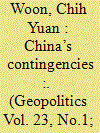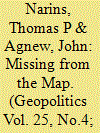| Srl | Item |
| 1 |
ID:
158362


|
|
|
|
|
| Summary/Abstract |
This paper examines the intimate relationship between narratives emanating from China and their uses of Chinese history, and how such perspectives inform China’s geopolitical positioning and practices in lieu of its purported ‘rise’. Taking inspiration from the deconstructive impetus of critical geopolitics, this article contends that these historical claims to China’s rise constitute deterministic accounts, hinging on the notion of Chinese exceptionalism to provide discursive backing for a Sinocentric geopolitical order in the coming decades. This in turn downplays ‘alternative’ historiographies that can shed light on how the nature of China’s emergence may be more dependent on and shaped by the external environment than previously acknowledged. Building on the historical-geographical expositions related to the idea of contingency, this article demonstrates how China (whether it be in the past or present) cannot be seen as operating in a vacuum but has to constantly negotiate and adjust its strategy of engagements/interactions based on the specific demands imposed by world politics. Specifically, by elucidating these dimensions through cross-strait relations between China and Taiwan, it is argued that understanding China’s contingencies can raise important questions for us to critically appreciate the contextual actors, processes and relationships that differentially impact on China’s engagements in the world.
|
|
|
|
|
|
|
|
|
|
|
|
|
|
|
|
| 2 |
ID:
172807


|
|
|
|
|
| Summary/Abstract |
Historical and conventional international relations (IR) frameworks describe the Belt Road Initiative (BRI) as representing a newly ambitious Chinese drive into global politics that positions China as moving away from its long-time reticence towards foreign entanglements. This raises a contradiction of China being at one and the same time both a defender of its own territorial sovereignty while also being engaged in various projects, particularly the BRI and the associated Asian Infrastructure Investment Bank (AIIB), that point in completely different directions. This paper seeks to build upon and move beyond conventional framings to understand how the BRI represents a conflict over the workings of state sovereignty that such frameworks have trouble addressing. We argue that the absence of an official Chinese government BRI map promotes a ‘useful fuzziness’ with regards to China being open to crafting a new as of yet undefined geopolitical identity. In light of the absence of such a map, this work considers key ideas relating to China’s geopolitical expansion via the BRI in terms of so-called sovereignty regimes – the idea that various practices of authority and control emanating originally from states take different geographical shapes. Conflicts arise when a state, such as China, finds itself caught between the operational imperatives of multiple regimes. By identifying the current sovereignty dynamics raised by the BRI in light of the relevant, yet distinctive historical experience of the Marshall Plan, this work can be used as a model for understanding how China’s current leadership is managing the debate of simultaneously protecting ‘strong borders’ yet also promoting a policy of ‘going out’.
|
|
|
|
|
|
|
|
|
|
|
|
|
|
|
|